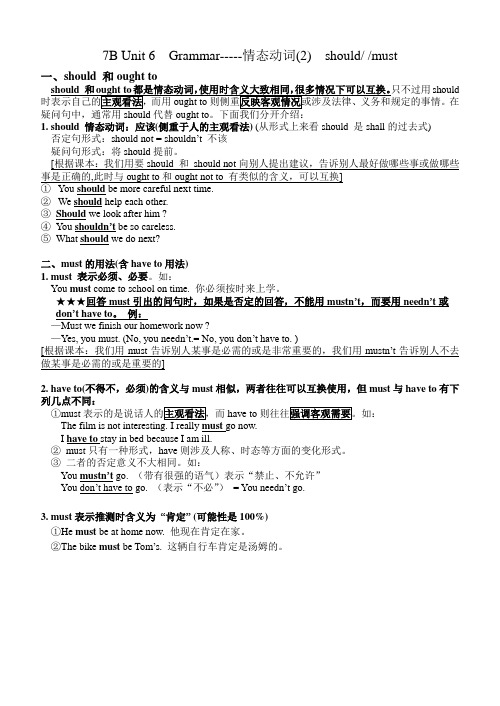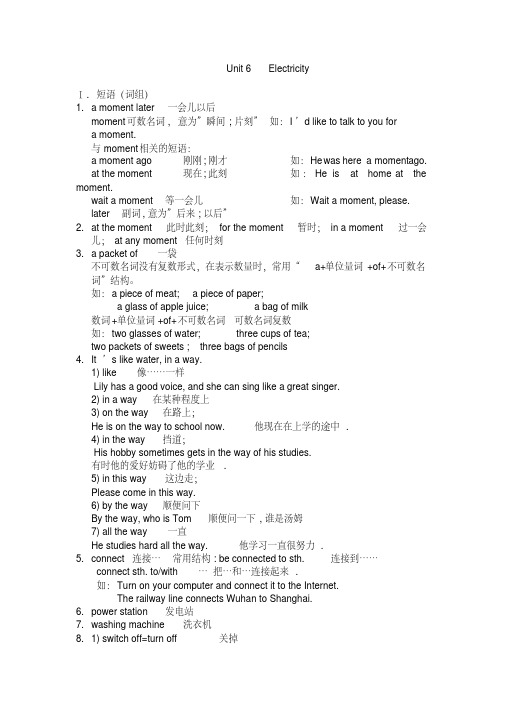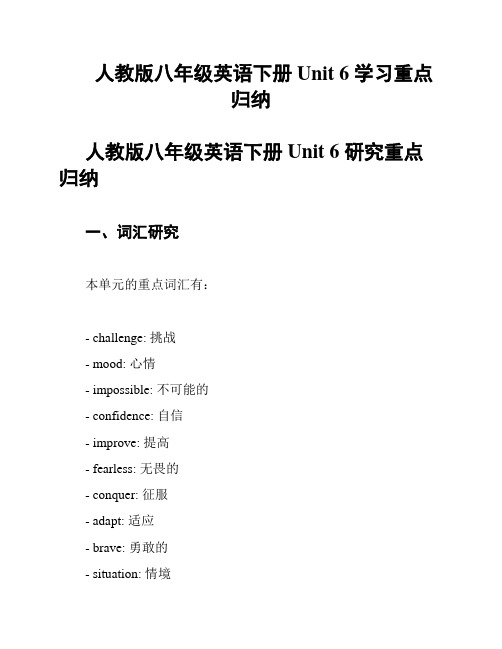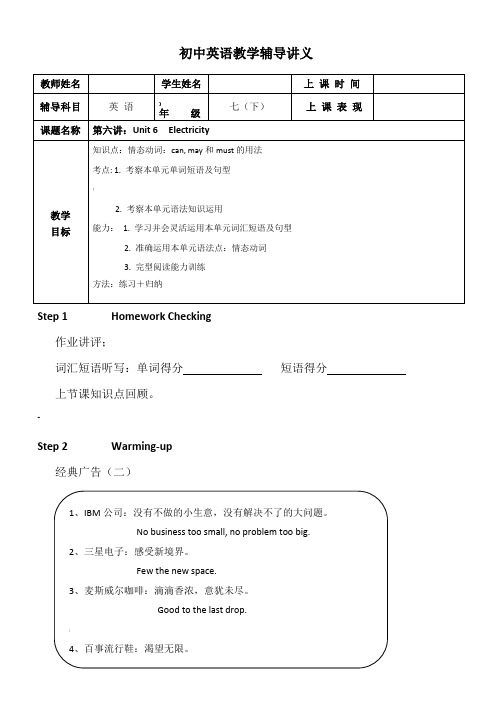unit 6 情态动词.
Unit6 Electricity 情态动词语法

易混点二:must和have to
1.must侧重于个人意志和主观上的必要。have to侧重于客观 上的必要,可用于现在时、过去时和将来时。 如:I know I must study hard.
我知道我必须努力学习。
My brother was very ill, so I had to call the doctor in the mid-night.
如:She can swim fast, but I can’t . 她能游得很快,但 我不能。 I can see with my eyes.我用眼睛看。 (2)表示许可,常在口语中。 如:You can use my dictionary. 你可以用我的字典。
否定 can't (1)表示不能。 I can't swim fast. (2)表示推测。 —Can it be our teacher? 那个人有可能是我们老师吗? —No, it can’t be our teacher. He is on a visit to the Great Wall. 不可能。咱们老师正在游览长城呢。
疑问
表示请求、许可,比can正式, 如:May I borrow your bike?
我可以借你的自行车吗?
might (1)表过去的“可能”和“允许”多用于间接引语。
如:She said that he might take her dictionary.
她说他可以拿她的词典去用。
(2)表示推测时。可能性低于may。
Unit 6 Electricity
Grammar
Modal verbs
Unit6 知识点归纳总结-牛津译林版英语八年级下册

be similar in sth 在某方面相似
be the same as… 与… 相同
be different from…与… 不同
e.g. ---Can you tell the differences between the two
pictures? ---Differences? They look quite _B_____.
trainer培训者 trainee受训者
Phrases:
train as/to be +职业:为…(职业)而训练
train for sth:为…而训练
train …to do sth: 训练…做某事
eg.训练成为一个老师t:rain to be/as a teacher
eg 为接下来的棒球 train for the coming baseball
Reading
1. Volunteering for the Special Olympics World Games 为夏季特奥会做志愿者 1) volunteer vi. & vt. 志愿做,义务做 volunteer for n/doing... 志愿做…;主动做… volunteer to do... 志愿做…;主动提出… e.g. 每个人都主动去打扫那个旧房子。
A. different
B. similar
C. strange
D. interesting
6.include (v)
including (prep)
eegg..IMhyahveobmbaiensyi_nh_co_lbu_bd_i_ee_s,(_包i_n_含c_lu_) _dfo_ino_gt_b_a_l(l包an含d )chess.
to都是情态动词

7B Unit 6 Grammar-----情态动词(2) should/ /must一、should 和ought toshould在1. should 情态动词:应该(侧重于人的主观看法) (从形式上来看should 是shall的过去式)否定句形式:should not = shouldn’t 不该疑问句形式:将should提前。
[根据课本:我们用要should 和should not向别人提出建议,告诉别人最好做哪些事或做哪些事是正确的,此时与ought to和ought not to 有类似的含义,可以互换]①Y ou should be more careful next time.②We should help each other.③Should we look after him ?④Y ou shouldn’t be so careless.⑤What should we do next?二、must的用法(含have to用法)1. must 表示必须、必要。
如:Y ou must come to school on time. 你必须按时来上学。
★★★回答must引出的问句时,如果是否定的回答,不能用mustn’t,而要用needn’t或don’t have to。
例:—Must we finish our homework now ?—Y es, you must. (No, you needn’t.= No, you don’t have to. )[根据课本:我们用must告诉别人某事是必需的或是非常重要的,我们用mustn’t告诉别人不去做某事是必需的或是重要的]2. have to(不得不,必须)的含义与must相似,两者往往可以互换使用,但must与have to有下列几点不同:①must have tomust go now.I have to stay in bed because I am ill.②must只有一种形式,have则涉及人称、时态等方面的变化形式。
Unit 6 Electricity情态动词can,may,must

Unit 6 ElectricityDate:_______ name:_______【知识要点】小议can,may,must情态动词有具体的词义,但也同助动词一样,需要与其他词语一起构成句子的谓语,另外情态动词没有人称和数的变化,情态动词后必须跟动词原形。
1.can的用法(1)表示能力、许可、可能性。
表示能力时一般译为“能、会”,即有某种能力,尤其是生来具备的能力,此时may和must均不可代替它。
如:She can swim, but I can't. 她能游泳,但我不能。
I can see with my eyes. 我能用眼睛看。
(2)表示许可,常在口语中。
如:You can use my dictionary. 你可以用我的字典。
(3)表示推测,意为“可能”,常用于否定句和疑问句中,此时can't译为“不可能”。
如: ---- Can the news be true? ---- No, it can't be.2.may的用法(1)表示请求、许可,比can委婉,如:May I borrow your bike? 我可以借你的自行车吗?You may go home now. 现在你可以回家了。
(2)表示推测,谈论可能性,意为“可能,或许”,一般用于肯定句中。
如:It may rain tomorrow. 明天可能会下雨。
She may be at home. 她可能在家。
3.must的用法(1) must表示主观看法,意为“必须、一定”。
如:You must stay here until I come back. 在我回来之前你必须呆在这儿。
Must I hand in my homework right now? 我必须现在交作业吗?(2)对must引导的疑问句,肯定回答为must,否定回答为don't have to或needn't。
如:--- Must I finish my homework? 我现在必须完成作业吗?--- No, you don't have to/needn't. 不,你没有必要现在完成作业。
Unit6__electricity

Unit 6 Electricity情态动词专练1. ( ) ----May I borrow your books? -- --Yes, you ______ .A. mayB. canC. mustD. need2. ( ) ---Can he speak English?----________.A .Yes, he does B.Yes,he did C. Yes, he can D.Yes, he must3. ( ) ----_______ I swim here? ----I‟m sorry. Children _____ swim alone here.A.Must; can‟tB. May; mustC. Can; mustn‟tD. Can‟t; can4. ( ) With the help of the new technology, you _____ e-mail your friends by mobile phone.A.canB. mustC. needD. should5. ( ) ----Can I go fishing with you, Dad?-----No, you _____. You ______ stay at home and do your homework.A.won‟t; mayB. can‟t; mustC. shouldn‟t ; oughtD. needn‟t; should6. ( ) Thomas, please be quiet. The others _____ hear very well.A. can‟tB. mustn‟tC.shouldn‟tD. needn‟t7. ( ) It‟s very warm today. You ____ wear the coat.A. mustB. don‟t have toC. have toD. mustn‟t8. ( ) Look at that man over there. he be our teacher Mr.Luo?--He be him. He has gone to Beijing.A.May;mustB.Can;mayC.Can;can‟tD.May;can‟t9.( ) You _____ talk loudly in the library.A. don‟tB. mustn‟tC. needn‟tD. don‟t have to10.( ) _____ climb that tall tree?A.Do you needB.Are you needC.Need youD.Need you to11.( )Some warm-hearted animals ___ hibernate (冬眠)A.needn‟tB.does not need toC.needn‟t toD.don‟t need12.( )____I go and apologize to my teacher for my mistake?A. ShouldB.NeedC.CanD. May13.( ) They _____ do well in the exam.A. can be able toB. be able toC. are able toD. am able to14.( ) Must I retrun the magazine to you right now, Sandy?No, you ______. You _____ keep it until next Wednesday.A. mustn‟t; mayB. needn‟t; mustC. needn‟t; canD. can‟t; may15.( ) I change the bulb now? --No, you may not. You switch off the electricity.A.Can;needB.May;mustC.Must;mustD.Can;must16.( )John____ come to see us tonight, but he isn‟t very sure yet.A.mayB.canC.has toD.must17.( )----Is Tom at home now?----He be at home now. Because I his room just now and he answered.A.must;calledB.can‟t;phoneC.may;calledD.must;phoned18.( )Shall I tell Tom something about it? --No,you .A.mustn‟tB.needn‟tC.can‟tD.won‟t19.( )My mother is ill. So I to look after my little brother.A.mustB.mayC.have toD. should20.( )You ____ go and see a doctor at once because you‟ve got a fever.A. canB. mustC.dareD. would用同义词(组)替代句中的划线部分。
牛津深圳版Unit-6--Electricity知识点-语法及练习

Unit 6 ElectricityⅠ. 短语(词组)1. a moment later 一会儿以后moment 可数名词, 意为”瞬间;片刻”如:I’d like to talk to you fora moment.与moment 相关的短语:a moment ago 刚刚;刚才如:He was here a moment a go.at the moment 现在;此刻如:He is at home at the moment.wait a moment 等一会儿如:Wait a moment, please.later 副词,意为”后来;以后”2.at the moment 此时此刻; for the moment 暂时; in a moment 过一会儿; at any moment任何时刻3. a packet of 一袋不可数名词没有复数形式,在表示数量时,常用“a+单位量词+of+不可数名词”结构。
如:a piece of meat; a piece of paper;a glass of apple juice; a bag of milk数词+单位量词+of+不可数名词可数名词复数如:two glasses of water; three cups of tea;two packets of sweets ; three bags of pencils4.It’s like water, in a way.1) like 像……一样Lily has a good voice, and she can sing like a great singer.2) in a way 在某种程度上3) on the way 在路上;He is on the way to school now. 他现在在上学的途中.4) in the way 挡道;His hobby sometimes gets in the way of his studies.有时他的爱好妨碍了他的学业.5) in this way这边走;Please come in this way.6) by the way 顺便问下By the way, who is Tom 顺便问一下,谁是汤姆7) all the way 一直He studies hard all the way. 他学习一直很努力.5.connect 连接…常用结构: be connected to sth. 连接到…… connect sth. to/with…把…和…连接起来.如:Turn on your computer and connect it to the Internet.The railway line connects Wuhan to Shanghai.6.power station 发电站7.washing machine 洗衣机8.1) switch off=turn off 关掉When the clock struck twelve, I switched off TV and went to bed.时钟敲响十二点时, 我关了电视上床睡觉。
人教版八年级英语下册Unit 6 学习重点归纳

人教版八年级英语下册Unit 6 学习重点归纳人教版八年级英语下册 Unit 6 研究重点归纳一、词汇研究本单元的重点词汇有:- challenge: 挑战- mood: 心情- impossible: 不可能的- confidence: 自信- improve: 提高- fearless: 无畏的- conquer: 征服- adapt: 适应- brave: 勇敢的- situation: 情境- supportive: 支持的- encourage: 鼓励- embarrassed: 尴尬的- express: 表达- express oneself: 表达自己二、语法要点本单元的语法要点有:1. 情态动词can的用法:- 表示能力:I can swim.(我会游泳)- 表示许可:Can I go to the restroom?(我能去洗手间吗?)- 表示可能性:It can be difficult to learn a new language.(研究一门新语言可能会很困难)2. 祈使句的用法:- Be confident and brave!(要有自信,要勇敢!)- Don't be afraid of making mistakes.(不要害怕犯错误。
)3. 用于建议的句型:- You should practice more.(你应该多练。
)- Why not join the English club?(为什么不加入英语俱乐部呢?)三、听力技巧在单元的听力部分,可以采取以下策略提高听力技巧:- 提前预课文,了解对话的背景和情境。
- 注意听对话中的关键词汇和关键信息。
- 针对对话中的问题,练提前预测答案。
- 养成多听多练的好惯,提高听力理解能力。
四、写作技巧在单元的写作任务中,可以采取以下写作技巧:- 在写作前,阅读所给的写作指导,明确写作内容和要求。
- 确定文章的结构,包括引言、主体和结论,并遵循逻辑顺序。
第6讲:Unit 6 Electricity(含参考答案)

初中英语教学辅导讲义教师姓名学生姓名上课时间辅导科目英语)年级七(下)上课表现课题名称第六讲:Unit 6 Electricity教学目标知识点:情态动词:can, may和must的用法考点: 1. 考察本单元单词短语及句型!2. 考察本单元语法知识运用能力: 1. 学习并会灵活运用本单元词汇短语及句型2. 准确运用本单元语法点:情态动词3. 完型阅读能力训练方法:练习+归纳Step 1 Homework Checking作业讲评;词汇短语听写:单词得分短语得分上节课知识点回顾。
~Step 2 Warming-up经典广告(二)1、IBM公司:没有不做的小生意,没有解决不了的大问题。
No business too small, no problem too big.2、三星电子:感受新境界。
Few the new space.3、麦斯威尔咖啡:滴滴香浓,意犹未尽。
Good to the last drop.;4、百事流行鞋:渴望无限。
Step 3 Phonetic Symbols语音基础小练习:/选出下列每组单词中音节数目与其他三项不同的一项。
( ) 1. A. bottom B. reply C. continue D. return ( ) 2. A. test B. fat C. fridge D. journey ( ) 3. A. major(C. tidyD. oxygenB. enjoy( ) 4. A. remember B. perfect C. potato D. furniture ( ) 5. A. favourite B. harmful C. produce^D. airport keys: CDDBAStep 4 Language LearningUnit Six Electricity单词归纳【单词重点讲解】1. electricity n. 电. Can you get me a packet of electricity 你能给我一包电吗【解析】(1)electricity 意思是“电”,常常用作不可数名词《(2)这个单词共有五个音节:e-lec-tri-ci-ty. We use electricity to run machines. 我们使用电力来运行机器。
- 1、下载文档前请自行甄别文档内容的完整性,平台不提供额外的编辑、内容补充、找答案等附加服务。
- 2、"仅部分预览"的文档,不可在线预览部分如存在完整性等问题,可反馈申请退款(可完整预览的文档不适用该条件!)。
- 3、如文档侵犯您的权益,请联系客服反馈,我们会尽快为您处理(人工客服工作时间:9:00-18:30)。
By 廖泽霞
6.1表示推测的用法 6.2 情态动词的现在完成式的用法 6.3 情态动词+不定式进行式 6.4 情态动词+不定式完成进行时
Outline
6.5 几个情态动词常考的句型
6.6 情态动词被动关系的主动表达法
6.7 一些情态动词的用法比较 6.8 情态动词的回答方式 6.9带to 的情态动词
37
2. Some women __ a good salary in a job instead of staying home, but they decided not to work for the sake of family.(2000年1月四 级题) A. must make B. should have made C. would make D. could have made
情态动词的特征
情态动词(modal verb)表示说话人的语气或情 态。情态动词本身虽有词义,但不完全,不 能单独作谓语动词,只能和不带to的动词不 定式连用,一起构成谓语动词。情态动词没 有人称和数的变化。
3
情态动词的语法特征
1) 情态动词不能表示正在发生或已经发 生的事情,只表示期待或估计某事的发生。 2) 情态动词 除ought 和have 外,后面 只能接不带to 的不定式。 3) 情态动词没有人称,数的变化,即情 态动词第三人称单数不加-s。 4) 情态动词没有非谓语形式,即没有不 定式,分词,等形式。
10
1 3
6.1表示推测的用法
•1 4)情态动词+动词的现在完成进行时。 表示对过去正在发生事情的推测。 Your mother must have been looking 2 for you. 你妈妈一定一直在找你。
1 3
11
6.1表示推测的用法
• 5)推测的否定形式,疑问形式用can’t, 1 couldn’t表示。 Mike can’t have found his car, for he came to work by bus this morning. 2 迈克一定还没有找回他的车,因为早上 他是坐公共汽车来上班的。 注意:could, might表示推测时不表示时态, 1 其推测的程度不如can, may。 3
• 3)情态动词+动词完成时。 1 表示对过去情况的推测。 We would have finished this work by the end of next December.明年十二月底前我们很 2 可能已完成这项工作了。 The road is wet. It must have rained last night.地是湿的,昨天晚上一定下雨了。
20
如:
You needn’t have come over yourself. As it turned out to be a small house party, we __ so formally. [A] needn’t dress up [B] did not need have dressed up [C] did not need dress up [D] needn’t have dressed up
12
6.2 情态动词的现在完成式的用法
1
• 情态动词现在完成式主要有两个功能: • 表已经发生的情况和表示虚拟语气。
2
1 3
13
在 这 两 个 方 面 must/mustn’t; can/can’t; need/needn’t;may/mayn’t;might/mightn’t; should/shouldn’t;ought to等情态动词+完 成式表示的意思是有一定区别的。
• 2)can’t / couldn’t have+过去分词, 表示对已发生情况的否定推测,译为 “(昨天)一定没……”。
17
如: Mary ___ my letter; otherwise she would have replied before now. [A] couldn’t have received [B] ought to have received [C] has received [D] shouldn’t have received
14
6.2.1表示已经发生的情况
1)must have+过去分词,表示对已发生情 况的肯定推测,译为“(昨天)一 定……”。 • (书P78,Section C29)
15
Байду номын сангаас
My pain____ apparent the moment I walked into the room, for the first man I met asked sympathetically:“ Are you feeling all right?” [A] must be [B] had been [C] must have been [D] had to be
6.5.3 used not to 或didn’t use to (过去不常 去做某事)为used to (do) 的否定式。 6.5.4 should 除了“应该”一层意思外,还要 掌握其“竟然”的意思。 如: I didn’t expect that he should have behaved like that. 我无法想象他竟然这样做。
5
• can 和should在这方面的语气较强、较肯定。
相比,may ,might这两个词在这方面的语气
较弱些、没有那么肯定,表示主观意断的可
能性,没有足够的客观依据。其中,might
的语气更为委婉、更弱。(书P78,C26)
6
You can't expect to be a top student without working hard at your study .(这种可能性很大。 因为,不努力学习怎么能成为尖子生呢?) This book should be found easily in the library . (说话人认为,图书馆应该有很多这类书籍,所 以应该很容易找到。)
Since the flight was cancelled, you might as well go by train. 既然航班已经取消了,你不妨乘火车吧。相 当于you had better go by train。 (书P77,Section A 8)
6.5.2 cannot / can’t…too …“越……越好, 怎么也不过分”。如: You cannot be too careful when you drive a car. 驾车时候,越小心越好。
18
3)may / might have +过去分词,表示对已 发生的事情做不肯定、可能性很小的推测, 或事实上根本没发生,译为“也许……”。 (书P78,Section C28)
19
6.2.2表示虚拟语气 1) needn’t have + 过去分词,表示做了不 必做的事,相当于”didn’t need to do”,译 为“其实没必要……”。
30
如: They shouldn’t have been chatting then.那时他们不该在闲谈。 They must have been working then. 他们一定一直在工作。
6.5 几个情态动词常考的句型:
6.5.1 may/might (just) as well “不妨,最 好”,与had better相近;
34
6.6 情态动词被动关系的主动表达法
6.6.1 want, require, worth(形容词)后面接 doing也可以表示被动意义。 如: Your hair wants(需要) cutting . The book is worth reading. The floor requires washing.
You may meet her at the party today.(说话人认 为,你今天或许有机会、有可能见到她。) You might mistake what I mean.(说话人婉转 地说明,大概、也许你误会我的意思了。)
7
6.1表示推测的用法
其用法如下: • 1)情态动词+动词原形。 表示对现在或将来的情况的推测,此时 动词通常为系动词。 I don't know where she is, she may be in Beijing.
35
6.6.2 need既可以用need to be done 也可以 使用need doing ,两种形式都表达被动的意 义。 The house needs painting= the house needs to be painted. The watch needed repairing= the watch needed to be repaired.
4
6.1表示推测的用法
• can, could, may, might, must 皆可表示推测, 1 用来表示"可能性"。但在表达的语气和程度 方面有所不同: can 和should表示以事实、理由为依据而存在 2 的可能性; 其中should的主观性较强,往往含有"应该会 怎么样"的意思。
1 3
38
3.He __ another career but, at the time ,he didn’t have enough money to attend graduate school(研究生院 ).(1995年1月六级 题) A. might have chosen B. might choose C. had to choose D. must have chosen
